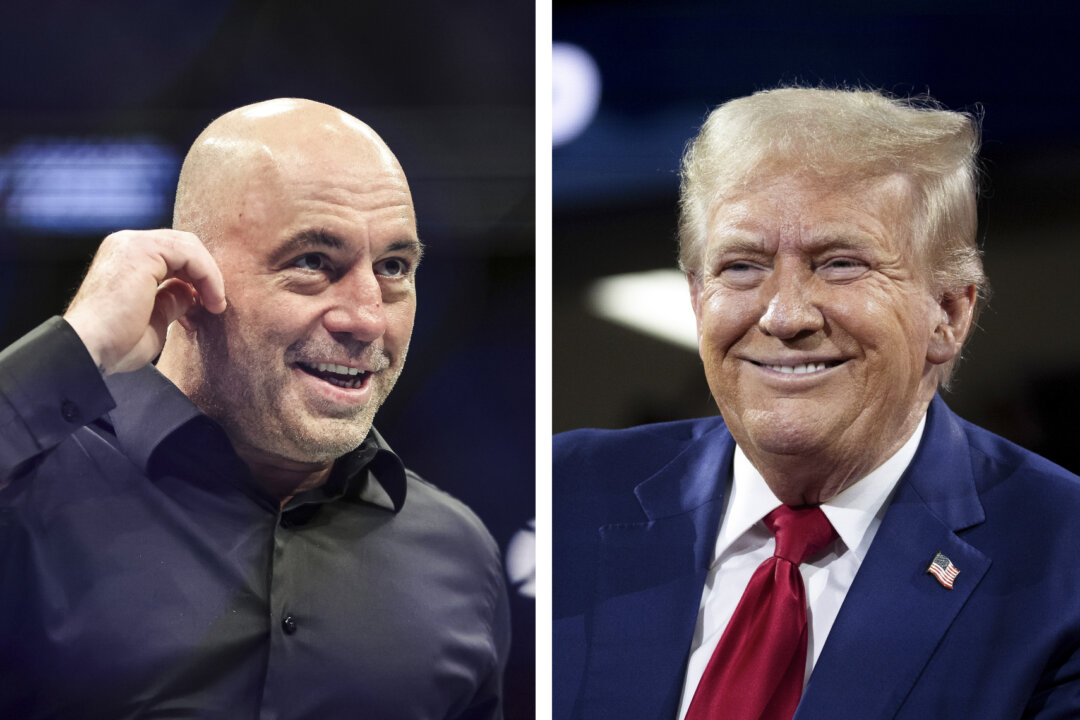‘Yeah, sure. But why not?’ Trump told podcast host Joe Rogan.
In his Oct. 25 appearance on “The Joe Rogan Experience” podcast, former President Donald Trump floated the idea of eliminating the income tax and substituting it with sweeping tariffs.
Host Joe Rogan asked if the Republican presidential candidate had made the suggestion, as earlier reports had indicated.
“Yeah, sure. But why not?” Trump replied.
“We will not allow the enemy to come in and take our jobs and take our factories and take our workers and take our families unless they pay a big price. And the big price is tariffs.”
He referenced President William McKinley, who served from 1897 until his assassination in 1901, as “the tariff king.”
“He spoke beautifully of tariffs,” Trump said.
McKinley was often nicknamed the “Napoleon of Protection” for his aggressive defense of high tariffs in the House of Representatives.
The Tariff Act of 1890—developed by McKinley—increased average taxes on all imports from 38 percent to 49.5 percent, intending to shield domestic manufacturing from foreign markets.
“And then, in the early 1900s, they switched over—stupidly, frankly—to an income tax. And you know why? Because countries were putting a lot of pressure on America: ‘We don’t want to pay tariffs, please don’t.’ You know they, believe me, they control our politicians.”
Despite introducing the income tax, the federal government maintained many tariff policies. The 1922 Fordney-McCumber Act raised the average import tax on imported goods to about 40 percent to protect farms. Eight years later, the Smoot-Hawley Tariff Act added approximately 20 percent taxes to agricultural products and manufactured goods imports.
Heading into the November election, Trump has proposed implementing a 10 percent universal across-the-board tariff and up to 60 percent levies on all China-made imports. His staunch pursuit of higher import taxes is to facilitate the onshoring and reshoring of American manufacturing and protect jobs for U.S. workers, he said.
However, Trump said, businesses that do not ship jobs overseas and maintain their operations within the nation’s borders would not be subjected to tariffs and instead, receive a lower corporate tax rate.
“There are no tariffs. All you have to do is build your plants in the United States and you won’t have any tariffs,” Trump said in an interview at the Economic Club of Chicago earlier this month. “I agree it’s going to have a massive effect, a positive effect—not a negative.”Until the federal government instituted an income tax in 1913, tariffs had been the primary source of revenue, accounting for as much as 95 percent of all receipts at times. Over the decades, tariff revenues have made up a smaller share of what the United States receives.
In fiscal year 2024, individual income taxes generated $2.426 trillion, accounting for nearly half of all federal revenues, which were $4.919 trillion. By comparison, Treasury Department data show customs duties injected $77 billion into government coffers in fiscal 2024, representing about 2 percent of federal tax receipts.
The U.S. government would need to raise tariffs by around 60 percent to fill the more than $2 trillion gaping hole in the federal budget that would appear if the income tax were erased.
The Tax Foundation estimates that Trump’s tariffs would generate as much as $449 billion in annual revenues and $3.824 trillion cumulatively over a 10-year window.
Projections from the Peterson Institute for International Economics (PIIE) suggest that yearly revenues from Trump’s tariffs would total about $225 billion per year.

Additionally, PIIE economists say that “it is literally impossible for tariffs to fully replace income taxes” because rates would need to be much higher to garner as much revenue.
Billionaire Howard Lutnick, a Wall Street executive at the helm of Trump’s transition operation, has resisted some criticisms. He recently described tariffs as merely a negotiation tactic and a “bargaining chip” that the former president could use to promote American industry and products and defend workers.
“This is just negotiating strategically,” Lutnick recently told CNBC. “When you’re running for office, you make broad statements so people understand you. Tariffs are an amazing tool for the president to use.”
“Use tariffs to build in America,” he added. “We need to protect the American worker.”
In July, White House economists weighed in on the proposal, stating in a paper that using tariffs as a primary revenue source would revitalize inflation “and invite deep economic distortions,” benefiting the wealthy and harming low- and middle-income households.
Vice President Kamala Harris opposes Trump’s plan to raise tariffs on China and has refrained from commenting on the current administration’s continuation of Trump-era tariffs on Chinese goods.
Last month, President Joe Biden also finalized a series of higher tariffs on Chinese goods.
At a May press briefing, U.S. Trade Representative Katherine Tai told reporters that the idea of tariffs raising prices for consumers “has been largely debunked.”

